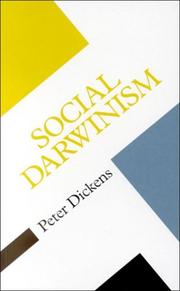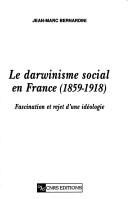| Listing 1 - 10 of 783 | << page >> |
Sort by
|
Book
ISBN: 1108879020 1108889042 1108881408 1108793800 9781108793803 9781108879026 Year: 2021 Publisher: Cambridge : Cambridge University Press,
Abstract | Keywords | Export | Availability | Bookmark
 Loading...
Loading...Choose an application
- Reference Manager
- EndNote
- RefWorks (Direct export to RefWorks)
This Element is a philosophical history of Social Darwinism. It begins by discussing the meaning of the term, moving then to its origins, paying particular attention to whether it is Charles Darwin or Herbert Spencer who is the true father of the idea. It gives an exposition of early thinking on the subject, covering Darwin and Spencer themselves and then on to Social Darwinism as found in American thought, with special emphasis on Andrew Carnegie, and Germany with special emphasis on Friedrich von Bernhardi. Attention is also paid to outliers, notably the Englishman Alfred Russel Wallace, the Russian Peter Kropotkin, and the German Friedrich Nietzsche. From here we move into the twentieth century looking at Adolf Hitler - hardly a regular Social Darwinian given he did not believe in evolution - and in the Anglophone world, Julian Huxley and Edward O. Wilson, who reflected the concerns of their society.
Social Darwinism. --- Darwinism, Social --- Competition --- Social change --- Social conflict --- Social evolution --- Social Darwinism

ISBN: 0335202195 0335202187 Year: 2000 Publisher: Buckingham Open University Press
Abstract | Keywords | Export | Availability | Bookmark
 Loading...
Loading...Choose an application
- Reference Manager
- EndNote
- RefWorks (Direct export to RefWorks)
Evolution. Phylogeny --- Sociological theories --- Social Darwinism. --- Darwinisme social --- Social Darwinism --- Darwinism, Social --- Competition --- Social change --- Social conflict --- Social evolution
Book
ISBN: 9791039901338 Year: 2023 Publisher: Lausanne : Éditions Page 2 ; Éditions Syllepse,
Abstract | Keywords | Export | Availability | Bookmark
 Loading...
Loading...Choose an application
- Reference Manager
- EndNote
- RefWorks (Direct export to RefWorks)
Les réponses proposées par Michel Husson à ces questions sont documentées de façon tout à la fois très inédite et originale. C'est à un véritable voyage que nous invite l'ouvrage, une pérégrination dans les discours de toutes celles et ceux, des scientifiques aux romanciers, qui se sont employés avec force, depuis le milieu du 18e siècle, à rendre les pauvres responsables de leur sort et, ce faisant, à permettre aux classes privilégiées de rationaliser de façon plus ou moins élaborée leur statut.0Michel Husson montre avec une force grande puissance démonstrative à quel point les discours actuels résonnent avec ceux du passé. L'ouvrage propose aussi un regard inédit sur la place de Darwin dans cette chaîne de justifications. Michel Husson défend l'idée que Darwin avait laissé toutes les portes ouvertes à ce que l'on appelle le ± darwinisme social??, autrement dit à l'extension à l'espèce humaine du principe de sélection. Il nous révèle à quel point la pénétration du darwinisme social a été profonde y compris chez les progressistes.0Il montre aussi à quel point la science, tout particulièrement économique et statistique, s'est en partie dévoyée pour dédouaner le mode d'organisation sociale, quand il ne s'est pas s'agit, avec l'eugénisme, de défendre une représentation anti-humaniste du monde. Car l'un des apports théoriques de l'ouvrage, outre les thèses développées sur le darwinisme social, est de mettre en évidence un constat souvent occulté: une grande majorité des économistes qui ont jeté les bases de la théorie aujourd'hui dominante ont adopté des positions assimilables au darwinisme social.0Un ouvrage utile pour celles et ceux qui s'interrogent sur les racines des lignes de fracture de nos sociétés qui font obstacle à un projet de progrès social.
Eugénisme. --- Darwinisme social. --- Poverty. --- Eugenics. --- Social Darwinism.
Book
Year: 1910 Volume: 12. hft. Publisher: Halle a.S., Gebauer-Schwetschke,
Abstract | Keywords | Export | Availability | Bookmark
 Loading...
Loading...Choose an application
- Reference Manager
- EndNote
- RefWorks (Direct export to RefWorks)
Anthropology. --- Sociology. --- Evolution (Biology) --- Social Darwinism.
Book
Year: 2012 Publisher: Paris : Perrin,
Abstract | Keywords | Export | Availability | Bookmark
 Loading...
Loading...Choose an application
- Reference Manager
- EndNote
- RefWorks (Direct export to RefWorks)
De son expédition autour du monde de 1831 à 1836, Charles Darwin, né en 1809, rapporte d'importantes collections de plantes et d'animaux. Retiré à la campagne pour raisons de santé, il publie en 1859 son grand œuvre, De l'origine des espèces au moyen de la sélection naturelle. Dès lors, il s'impose comme le fondateur de la théorie de l'évolution biologique, dans laquelle la notion de sélection naturelle des espèces sous l'influence du milieu occupe une place centrale. Décrivant d'une plume alerte et rigoureuse le rayonnement posthume d'une doctrine qui finit par être reconnue non sans mal, l'auteur montre notamment en quoi les idées de Lyssenko – le biologiste préféré de Staline – étaient antidarwiniennes et représentaient une insulte à la science. De même, il s'attaque au créationnisme d'aujourd'hui. Enfin, il expose les éléments importants de la théorie synergique qui renouvelle le darwinisme, englobant ainsi les plus récentes découvertes de la connaissance contemporaine.
Evolution (Biology) --- Evolution --- History. --- Darwinism --- Darwin, Charles,
Book
ISBN: 2234010594 9782234010598 Year: 1979 Publisher: Paris Stock
Abstract | Keywords | Export | Availability | Bookmark
 Loading...
Loading...Choose an application
- Reference Manager
- EndNote
- RefWorks (Direct export to RefWorks)
Sociobiology --- Social Darwinism --- #GROL:SEMI-316-05 --- 316.24
Book
Abstract | Keywords | Export | Availability | Bookmark
 Loading...
Loading...Choose an application
- Reference Manager
- EndNote
- RefWorks (Direct export to RefWorks)
"In this book, Noah Horwitz argues that the age of Darwinism is ending. Building on the ontological insights of his first book Reality in the Name of God in order to intervene into the intelligent design versus evolution debate, Horwitz argues in favor of intelligent design by attempting to demonstrate the essentially computational nature of reality. In doing so, Horwitz draws on the work of many of today's key computational theorists (e.g., Wolfram, Chaitin, Friedkin, Lloyd, Schmidhuber, etc.) and articulates and defends a computational definition of life, and in the process lays out key criticisms of Darwinism. He does so in part by incorporating the insights of the Lamarckian theories of Lynn Margulis and Maximo Sandin. The possible criticisms of a computationalist view from both a developmental perspective (e.g., Lewontin, Jablonka, West-Eberhard, etc.) and chaos theory (e.g., Brian Goodwin) are addressed. In doing so, Horwitz engages critically with the work of intelligent design theorists like William Dembksi. At the same time, he attempts to define the nature of the Speculative Realist turn in contemporary Continental Philosophy and articulates criticisms of leading figures and movements associated with it, such as Object-Oriented Ontology, Quentin Meillassoux, and Ray Brassier. Ultimately, Horwitz attempts to show that rather than heading towards heat death, existence itself will find its own apotheosis at the Omega Point. However, that final glorification is only possible given that all of reality is compressible into the divine name itself"--https://punctumbooks.com/titles/divine-name-verification/, accessed 06/04/2020.
Theology, Practical. --- continental philosophy --- intelligent design --- cubernetics --- Darwinism --- biology

ISBN: 2271054834 2271078474 9782271054838 Year: 1997 Publisher: Paris : C.N.R.S.-Editions (Centre National de la Recherche Scientifique),
Abstract | Keywords | Export | Availability | Bookmark
 Loading...
Loading...Choose an application
- Reference Manager
- EndNote
- RefWorks (Direct export to RefWorks)
truggle for existence, survival of the fittest ... It has long been believed that the use for political and social purposes of the theories of Charles Darwin was a specialty of the Anglo-Saxon countries only. Contrary to this generally accepted idea, the author maintains that a real Darwinian culture developed in France in the last century, far beyond the inner circle of scientists, and often against their will. For the attention to mediators of a scientific culture, this book shows how in his philosophical debates, religious and political, the France of the long nineteenth ecentury first expressed its fascination and then its reluctance for the new evolutionary ideas of Charles Darwin. The in-depth study of the phenomena of circulation, rooting or rejection of a scientific ideology ultimately sheds a singular light on the resistance of French scientists to Darwinian theories, resistance which made them fall far behind in the field of evolutionary biology.
Social Darwinism --- -Darwinism, Social --- -Social Darwinism --- Darwinism, Social --- Competition --- Social change --- Social conflict --- Social evolution --- Darwinisme social --- France --- History --- 18th-19th centuries --- Darwinism. --- Ideology. --- Knowledge, Theory of --- Philosophy --- Political science --- Psychology --- Thought and thinking --- Social Darwinism - France --- darwinisme social --- racisme --- Troisième République --- eugénisme
Book
ISBN: 9782343030982 2343030987 Year: 2014 Volume: *135 Publisher: Paris L'Harmattan
Abstract | Keywords | Export | Availability | Bookmark
 Loading...
Loading...Choose an application
- Reference Manager
- EndNote
- RefWorks (Direct export to RefWorks)
Analyse des paradoxes de la pensée d'Herbert Spencer, philosophe britannique libéral, précurseur de l'évolutionnisme et sociologue interrogeant le concept de sympathie dans sa naturalisation à l'échelle de la société. ©Electre 2015
Evolution (Biology) --- Social Darwinism. --- Evolution (Biologie) --- Darwinisme social --- History --- Histoire --- Spencer, Herbert, --- Spencer, Herbert --- Criticism and interpretation --- 19th century --- Social Darwinism --- Philosophical anthropology --- Evolution
Book
ISBN: 9062569315 9789062569311 Year: 1990 Volume: 3 Publisher: Amsterdam : VU University Press,
Abstract | Keywords | Export | Availability | Bookmark
 Loading...
Loading...Choose an application
- Reference Manager
- EndNote
- RefWorks (Direct export to RefWorks)
Racism --- Colonization --- Racisme --- Colonisation --- Race relations. --- Social Darwinism. --- Colonies --- Administration. --- Colonies - Administration.
| Listing 1 - 10 of 783 | << page >> |
Sort by
|

 Search
Search Feedback
Feedback About UniCat
About UniCat  Help
Help News
News